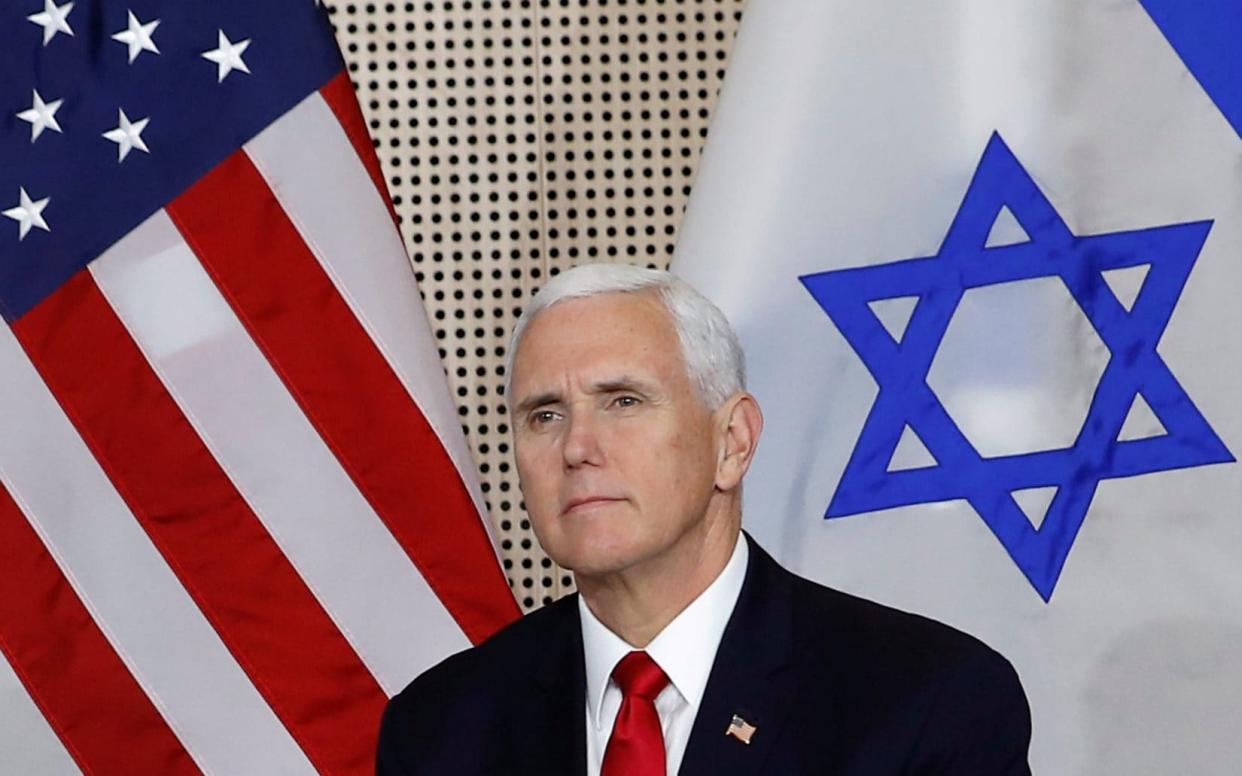Mike Pence attacks UK for 'breaking US sanctions against Iran'

Mike Pence, the US vice president, has accused Britain, France and Germany of trying to sabotage American sanctions against Iran and called on the European states to withdraw from the 2015 nuclear deal.
In an unusually blunt attack on America’s traditional European allies, Mr Pence told a summit in Warsaw that the three countries were leading “an effort to break American sanctions against Iran’s murderous revolutionary regime”.
He focused his criticism on a financial mechanism created by the three states and the EU to allow European firms to continue trading with Iran in a way that skirts punishing US sanctions.
“It's an ill-advised step that will only strengthen Iran, weaken the EU, and create still more distance between Europe and the United States,” Mr Pence said.
He said the British, French, and German governments had “not been nearly as cooperative” in backing America’s anti-Iran policy as Israel and the Gulf Arab states like Saudi Arabia and the UAE.
Mr Pence said for the first time that the three countries should pull out of the nuclear agreement, which was signed in 2015 by Britain, France, Germany, Russia, China, the US and Iran. “The time has come for our European partners to withdraw from the Iran nuclear deal.”

Other US officials, including Donald Trump, have harshly criticised the deal but never before called for the European states to leave it.
There was no immediate response from the Foreign Office to Mr Pence’s criticism.
The US-hosted conference in Poland was enthusiastically attended by Israel and the Gulf states but the European governments which continue to support the Iran deal largely stayed away.
Jeremy Hunt, the foreign secretary, attended the opening dinner of the summit on Wednesday night but left before the main meetings on Thursday. Germany sent a junior minister and France was represented by a foreign ministry official.
Benjamin Netanyahu, the Israeli prime minister, hailed the summit for bringing Israel together with its Arab neighbours “against the common threat of the Iranian regime”.
Mr Netanyahu sat next to the foreign minister of Yemen at the conference, an image that would have once been unthinkable in the Middle East.
Here is @IsraeliPM Netanyahu sitting next to #Yemen's Foreign Minister Khaled Hussein Alyemany, at the #WarsawSummitpic.twitter.com/d7c5jRwKXp
— Raphael Ahren (@RaphaelAhren) February 14, 2019
However, there still appears to be a ceiling on how far the Arab states will go in befriending Israel without a solution to the Palestinian issue.
While the Israeli leader sat in the same room as ministers from Saudi Arabia and the UAE, none of them were prepared to hold a formal meeting with Mr Netanyahu or publicly shake his hand.
Prince Turki al-Faisal, Saudi Arabia’s former spy chief, granted an unprecedented interview to Israeli television where he warned that there would not be peace between the Jewish state and Saudi Arabia until there was a deal on the Palestinians.
“From the Israeli point of view, Mr. Netanyahu would like us to have a relationship, and then we can fix the Palestinian issue. From the Saudi point of view, it’s the other way around,” he said.
Donald Trump has tasked his son-in-law, Jared Kushner, with brokering a peace deal between Israelis and Palestinians.
Mr Kushner told the conference the deal would not be released until after the Israeli elections in April and said that both sides would have to make compromises. However, he declined to give even basic details of his plan.
The US said that the Palestinians had been invited to the summit and refused to come. Palestinian officials said an invitation had only been issued five days before the start of conference, long after other governments were formally invited.
“This is not serious,” a Palestinian official said. “This is just part of the blame game of the Trump Administration in cooperation with their Polish friends.”
An FCO spokesperson said: “The UK Government regards the JCPoA as a crucial agreement that makes the world a safer place by neutralising the threat of a nuclear-armed Iran. We remain committed to preserving the JCPoA, which is why we are establishing a European Special Purpose Vehicle (SPV) with the E3 that aims to deliver the sanctions relief we committed to as part of the agreement.
“The UK is not and has never been naïve about Iran and its nuclear intentions and while we share US concerns about Iranian regional activities and its missile programme, we believe the best way to address these wider concerns is while the nuclear deal remains in place.”

